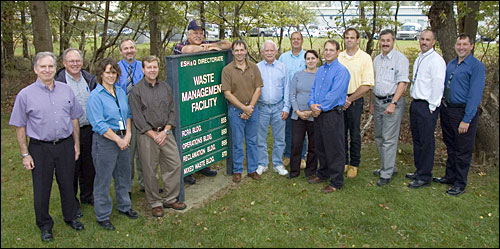Brookhaven Lab Honored with EPA Environmental Achievement Award
October 17, 2006
UPTON, NY - The U.S. Department of Energy's Brookhaven National Laboratory is being honored with a National Partnership for Environmental Priorities (NPEP) Achievement Award for reducing both its mercury waste generation and its inventory of polychlorinated biphenyls (PCBs). The NPEP encourages public and private organizations to form voluntary partnerships with the U.S. Environmental Protection Agency (EPA) to reduce the use or release of any of 31 priority toxic chemicals and metals identified by the EPA. The goal of the program is to reduce the use or release of four million pounds of these toxic substances by 201l.
Brookhaven Lab joined the NPEP program in 2004, and the Laboratory has since exceeded goals to reduce its mercury waste generation by 25 percent and lower its inventory of PCBs by 50 percent, both by the end of 2006. In fact, the Laboratory's mercury waste generation dropped by 83 percent, from 600 pounds in 2003 to 100 pounds in 2005, and Brookhaven's inventory of PCBs dropped by more than 90 percent, from 4,760 pounds to 445 pounds between 2005 and 2006.
 enlarge
enlarge
Brookhaven employees who helped the Laboratory to attain the National Partnership Achievement Award are: (from left) John Taylor, Basic Energy Sciences Directorate; Ed Murphy, Plant Engineering Division; Deborah Bauer, Environmental & Waste Management Services Division (EWMS); George Goode, EWMS; John Selva, EWMS; Walter Shaffer, Collider-Accelerator Department (C-A); Peter Pohlot, EWMS; Joel Scott, C-A; Melvin Van Essendelft, EWMS; Anna Bou, Mark Davis, Leo Palumbo, Steve Ferrone, Keith Klaus, and Bob Lee, all of EWMS. Click image to download hi-res version.
The NPEP award will be presented to Brookhaven Lab on October 19, at a ceremony at the annual NPEP conference, to be held in Arlington, Virginia. Robert Lee of Brookhaven's Environmental and Waste Management Services Division, said, "Our division would like to thank everyone - from scientists to support staff - who helped us achieve these NPEP goals. We continually strive to reduce pollution and manage wastes at Brookhaven, with employees' and the community's safety as our top priority."
Exposure to mercury can cause numerous health problems, including harm to the brain, heart, kidney, lungs, and immune system. Over many years, Brookhaven Lab has cleaned sanitary mains and sink traps to rid them of mercury that may have been accidentally spilled. In 2005, the Laboratory completed a Superfund-mandated remediation project to clean contaminated sediments from the Peconic River, including elevated levels of mercury attributed to past disposal practices.
Also, Brookhaven switched all fluorescent light fixtures to low-mercury bulbs when they became available. Mercury-containing devices, such a thermometers and temperature-control devices, were replaced with alternatives, such as alcohol thermometers and solid state electronic controls. As a result of these and other efforts, the Laboratory's mercury inventory dropped by 38 percent since 2003.
PCBs were developed in the 1940s and were used widely in heat transfer fluids in transformers and capacitors. Because of their potentially dangerous health effects, including increased cancer risk, PCBs were banned in 1979 from being manufactured or distributed in commercial products. Brookhaven Lab converted all of its PCB-filled transformers to ones containing alternative dielectric fluids.
At Brookhaven's Alternating Gradient Synchrotron, an accelerator that began operations in 1960, 314 capacitors containing 1.5 gallons each of PCB dielectric fluid were removed and replaced with non-PCB equipment. Now the Laboratory's PCB inventory is less than 10 percent of its 2003 level, and it is expected to be reduced to zero in the future, as old equipment is replaced with new.
2006-10550 | INT/EXT | Newsroom









